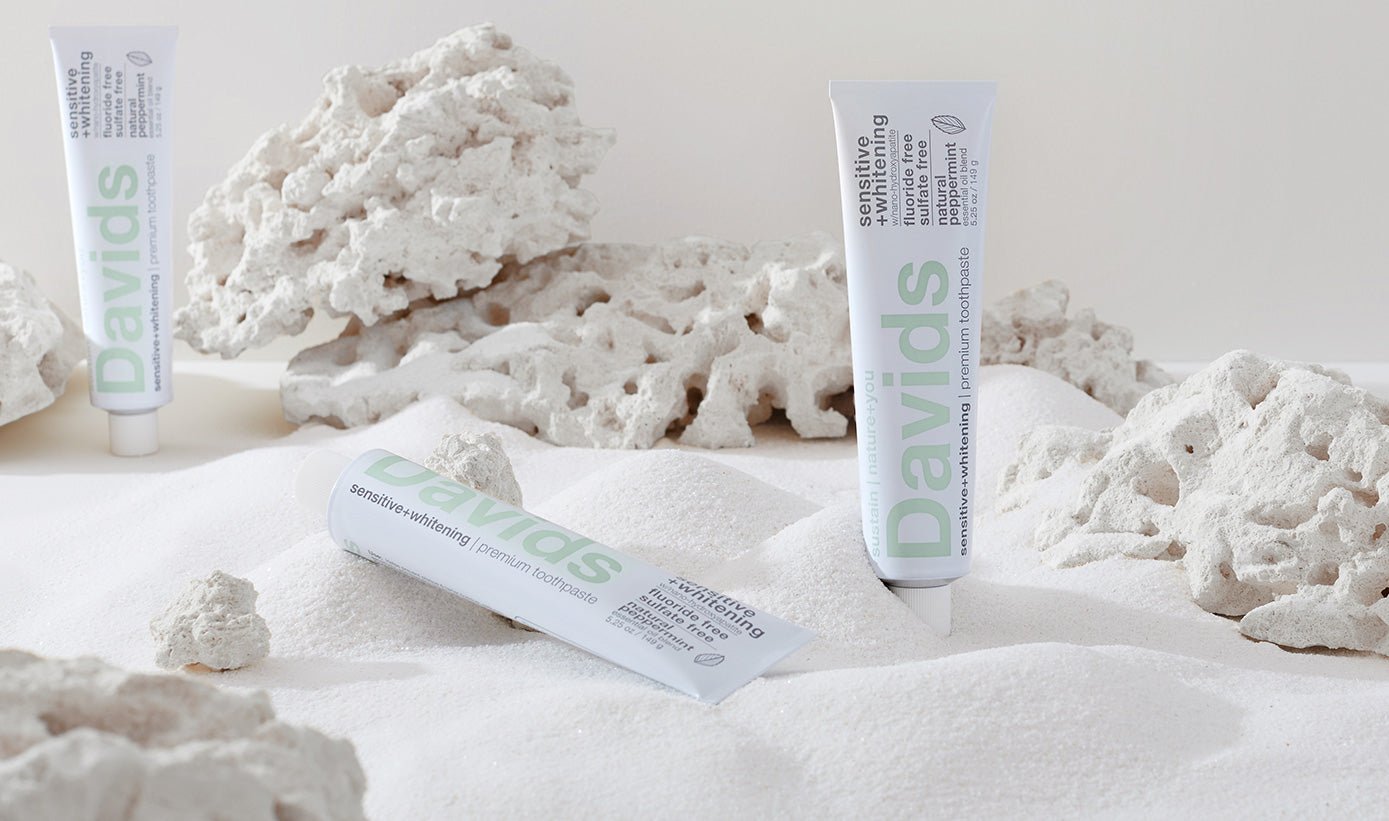Do you have that one sensitive tooth that always seems to get in the way? It forces you to chew on one side of your mouth, sip through a straw, and be extra careful when you brush on that side.
We know that sensitivity, in general, can be extremely uncomfortable and disruptive. But when it’s just one sensitive tooth, it can even feel a little bit mocking. All of your other teeth feel fine, so why is this one giving you such grief? It’s not like you’re skipping it when you brush!
Don’t worry, we completely understand the frustration. And we’re here to tell you that there can be several different causes (and solutions) for that one sensitive tooth! Sensitivity isn’t always your fault. In fact, it can even happen when you’re sleeping. Let’s dive into some of the many causes of your one sensitive tooth and how adding hydroxyapatite toothpaste into your routine can work wonders for this pesky issue.
what’s happening inside a sensitive tooth?
Tooth sensitivity occurs when the hard outer layer of your tooth (enamel) is worn down, exposing the layer underneath (dentin). Your dentin contains tubules, which are little tube-like pathways that lead to your ultra-sensitive tooth’s center nerve.
If your enamel gets worn down over time through things like poor oral care, rough brushing, plaque buildup, etc., these tubules become exposed to all outside forces such as food, drinks, sugar, cold air, and beyond. These outside forces now suddenly have access to your tooth’s center nerve, causing extreme sensitivity.
Now you might be thinking....how can plaque buildup or rough brushing affect just one tooth? Wouldn’t it affect more of them? That’s a great question, let’s dive into some reasons why you might have just one sensitive tooth.
why you might have just one sensitive tooth
One sensitive tooth might be an indication that the issue isn’t simply plaque or aggressive brushing. There are a few reasons why sensitivity might be able to single out just one tooth, let’s explore some of them.
- tooth decay: has it been a while since you’ve gotten an x-ray at the dentist? This would tell us if your one sensitive tooth is actually a result of tooth decay. If that’s the case, your dentist can prescribe a treatment such as a filling to relieve the sensitivity. Tooth decay can “target” one single tooth because of its location. It’s possible that the tooth is used more frequently than others for chewing, so it’s often exposed to sugars and acid-forming bacteria that wear down its enamel over time.
- gum recession: this is actually one of the leading causes of sensitivity, especially in just one tooth! Over time, harsh brushing or general wear and tear can cause your gum tissue to recede on one tooth (or more). Your gum tissue is another protective layer for your dentin. Below your gums, your teeth don’t have any enamel! So they rely on your gums for protection, keeping those tubules protected from the outside world.
- jaw clenching (bruxism): clenching is another common cause of localized sensitivity. If you have an off-center bite, or if you tend to clench at an angle during the night, it can wear down your enamel in one localized area. Clenching/grinding can also lead to gum recession, as it puts serious pressure on your gums. Serious tooth grinding can also make your teeth “loosen” in their sockets, creating pockets for bacteria to fester and cause even more sensitivity. How do you know if you’re clenching at night? Keep an eye out for the common symptoms of clenching, such as jaw soreness, tension headaches upon waking, ear aches, or clicking in your ears when you open your jaw.
Other (more obvious) causes of sensitivity include a loose filling or a cracked tooth. If you’re experiencing sensitivity in a tooth that has a history (your dentist has already done some work on it), then we highly recommend going to visit your dentist to see if everything is in place.
No matter what, we recommend visiting your dentist to get a professional opinion instead of self diagnosing. One sensitive tooth could be the sign of a bigger issue, and your dentist will be able to outline the next steps, whether it’s a filling or a mouth guard.
how hydroxyapatite provides tooth sensitivity relief
After you’ve been cleared from any serious issues by your dentist, nano-hydroxyapatite (n-HA) could be the missing piece to your one-sensitive-tooth puzzle.
While many conventional sensitive toothpastes rely on chemical numbing agents and fluoride to “relieve” your sensitivity, we prefer the (lab-tested) natural route. Unlike fluoride and chemical numbing agents that act as a bandaid quick fix, nano-hydroxyapatite particles actually work to repair sensitivity at the source.
You see, hydroxyapatite already makes up the majority of your enamel, so when you brush daily with hydroxyapatite toothpaste, you give your enamel a natural dose of the mineral it needs. The nano-hydroxyapatite particles in our sensitive+whitening toothpaste penetrate your enamel, plugging the exposed tubules that lead to your tooth’s center nerve. After just a few days of daily brushing with our hydroxyapatite toothpaste, your one sensitive tooth should feel a whole lot of relief.
How can we be so sure? Because our third-party lab test revealed photo evidence that our hydroxyapatite toothpaste outperformed leading competitors when it came to plugging exposed tubules. Check out the results for yourself, or better yet....give our hydroxyapatite toothpaste a try and let us know how much better your sensitive tooth (or teeth) feel after just a few days.








